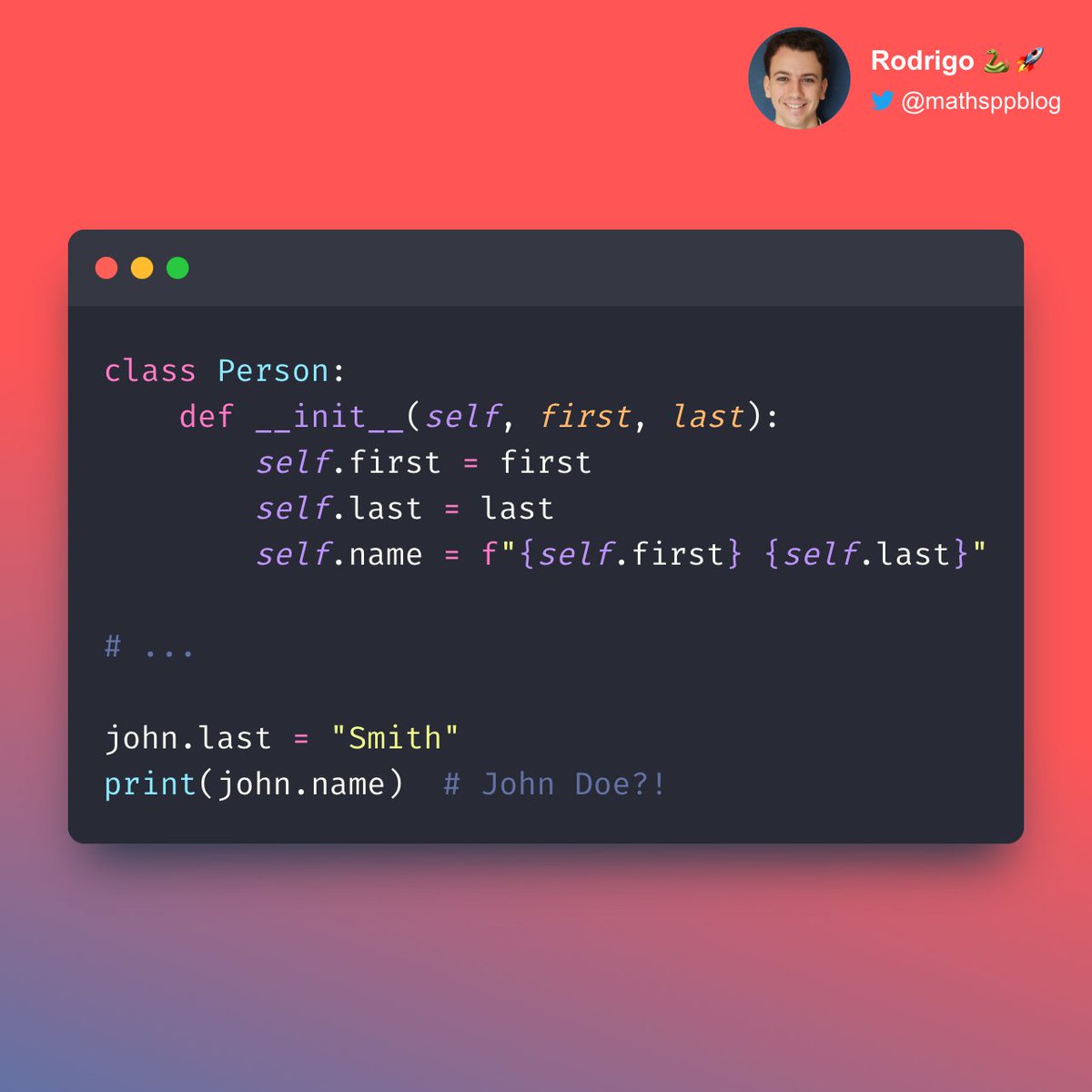Python 🐍 dictionaries are amazing ✨ data structures.
Do you know how to make the best use out of them?
One method you should have in your arsenal is the `.get` method.
Here's a short thread 👇🧵 about it.
Do you know how to make the best use out of them?
One method you should have in your arsenal is the `.get` method.
Here's a short thread 👇🧵 about it.

A dictionary is a “mapping”: it maps keys into values.
In Python, if you have a key, you can use it inside `[]` to access the corresponding value 👇
However, ...
In Python, if you have a key, you can use it inside `[]` to access the corresponding value 👇
However, ...

... if the key doesn't exist, then you get an error!
As an example, here's my attempt at getting my age from the previous dictionary, which only knew about my name 👇
So, how to try and access keys without having Python throw an error at your face..?
As an example, here's my attempt at getting my age from the previous dictionary, which only knew about my name 👇
So, how to try and access keys without having Python throw an error at your face..?

One thing you can do is use the `in` operator to check if the `key` exists in your dictionary 👇
Then, you'd use an `if` statement to check if you could access a given key.
Then, you'd use an `if` statement to check if you could access a given key.

Another alternative is to use exception handling to handle the `KeyError` you get 👇
However, sometimes, either alternative is too much...
However, sometimes, either alternative is too much...

The `.get` method is a “safe” way to get a dictionary's values.
You give it a key, and the `.get` method does NOT throw an error if the key isn't there 👇
Instead, it returns `None`.
However, you can change that!
You give it a key, and the `.get` method does NOT throw an error if the key isn't there 👇
Instead, it returns `None`.
However, you can change that!

The `.get` method accepts a second argument, which is the “default value”.
The default value is what `.get` returns if the key wasn't there 👇
The default value is what `.get` returns if the key wasn't there 👇

This is a great method to know about.
Now, when do you use `.get`?
Well, I personally like to use it when I want to try and get some information that I am going to use right away.
Except, if the info isn't there, I will do nothing.
Now, when do you use `.get`?
Well, I personally like to use it when I want to try and get some information that I am going to use right away.
Except, if the info isn't there, I will do nothing.
Depending on the operation that I want to do afterwards, I use `.get` with different default values.
The idea is that the “default value” should act as a “no-op”, or a “do nothing” value for the operation that I'm doing next.
Here are some examples 👇
The idea is that the “default value” should act as a “no-op”, or a “do nothing” value for the operation that I'm doing next.
Here are some examples 👇
Imagine you need to open a dictionary to fetch a list.
After doing that, you want to use a `for` loop to go over the list...
But if there's no list, you don't want to do the `for` loop...
Instead, you can use `.get` with an empty list:
After doing that, you want to use a `for` loop to go over the list...
But if there's no list, you don't want to do the `for` loop...
Instead, you can use `.get` with an empty list:
https://twitter.com/mathsppblog/status/1445780000955719682
Another example which might be more down-to-Earth.
Imagine you are selling a product and your Python code is now validating the sale.
You get a dictionary with information about the product and you want to check for a discount, to apply it:
Imagine you are selling a product and your Python code is now validating the sale.
You get a dictionary with information about the product and you want to check for a discount, to apply it:
https://twitter.com/mathsppblog/status/1445860048706572295
Another example I use a lot is when I need to reach inside nested dictionaries, but those nested dictionaries might not be there...
Then, using `.get` with a default value of `{}` is a real life-saver!
Then, using `.get` with a default value of `{}` is a real life-saver!
https://twitter.com/mathsppblog/status/1446120645067112455
• • •
Missing some Tweet in this thread? You can try to
force a refresh


![Diagram showing how you can use f-strings and their format specification to redact private or sensitive information, like email addresses. The code from the diagram: def redact_email(email): user, _, domain = email.partition("@") return f"{user[:2]:*<{len(user)}}@{domain}" print(redact_email("rodrigo@mathspp.com")) # ro*****@mathspp.com](https://pbs.twimg.com/media/GqhlkWbXgAAE9kd.jpg)

















